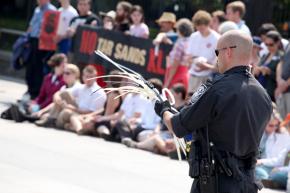Sitting in against the pipeline
and report on a mass civil disobedience to protest the tar sands oil project in Canada and a pipeline proposed to stretch across the U.S.
MORE THAN 1,000 activists were arrested between August 20 and September 3 in front of the White House in one of the largest-ever environmental civil disobedience actions in the U.S. as part of the fight to stop the Keystone XL pipeline and the development of tar sands oil.
The proposed 1,700-mile-long Keystone pipeline would carry tar sands oil, the world's dirtiest fuel, from Alberta, Canada through the heartland of the U.S. to the Gulf Coast.
In Alberta, the extraction of tar sands will involve "basically scrapping a section of forest that is the size of Florida or England to mine this gritty, dirt-like oil, and try to turn it into something that we can burn," said one activist. "We need to do something different. That's desperation. It's bad for the climate. It's bad for the communities there. It's bad for everyone basically."
The action was organized by a coalition of groups and individuals such as climate advocate Bill McKibben. In their invitation letter, the organizers of the Tar Sands Action challenged people to put their bodies on the line for climate justice: "Twenty years of patiently explaining the climate crisis to our leaders hasn't worked. Maybe moral witness will help. You have to start somewhere, and we choose here and now."

Protesters came to Washington from across the U.S. and Canada to demonstrate. Every day for two weeks, different communities marched solemnly in front of the White House, and that sat down in an act of civil disobedience. Banners read, "We sit in against the XL pipeline" and "Obama, will you stand up to big oil?"
Among those who spoke out and participated in the actions were indigenous leaders from Canada and the U.S.; residents of states the pipeline will pass through, like Nebraska and Montana; Gulf Coast residents; people from Appalachia who are fighting other battles against the energy industry giants; communities of faith; scientists; young activists; and many more. Individuals like LGBT activist Lt. Dan Choi, filmmaker Josh Fox, author Naomi Klein and actress Daryl Hannah were also part of the sit-ins.
In Seattle, local activists inspired by the demonstrations in Washington organized a solidarity demonstration in a week's time, largely through Facebook. Some 35 people gathered in downtown Pioneer Square and then marched a block to the local headquarters of Barack Obama's reelection campaign. In the Pacific Northwest, there is another dimension to the tar sands project that has been a focus for activism--the so-called Heavy Haul that is delivering gargantuan equipment to the tar sands project in Alberta.
Joey Gray, one of the organizers of the Seattle demonstration, said she and her friends thought about flying to Washington to participate, but "some of us said, 'Wait a second.' We fully support representatives from all across the country being there, but we wanted to do something here so we could gather our local friends and be in solidarity with those actions."
IN WASHINGTON, many protesters chose to wear Obama 2008 T-shirts and pins while being arrested, but at the same time, they expressed frustration and disappointment with the administration's inaction in stopping dirty fuels, taking action on climate change or standing up to corporate greed.
The stakes in this struggle are high. Opponents believe that construction of the pipeline would devastate indigenous communities and ecosystems, lead to an increase in pipeline spills and pollute drinking water sources, including the Ogallala Aquifer, which provides over 2 million people with drinking water.
James Hansen, a leading climate scientist at NASA who has been outspoken in warning about the threats of greenhouse gas emissions, was one of those arrested outside the White House. "If the tar sands are thrown into the mix," Hansen said, "it is essentially game over" in terms of global warming reaching the point where ocean levels rise and access to food and water are threatened.
Kandi Mossett, the Tribal Campus Climate Challenge organizer with the Indigenous Environmental Network, traveled from North Dakota for the action to convey that stopping the pipeline is a struggle for both environmental justice and indigenous rights. "We are out here because people are dying, Mossett said. "How dare they say [that tar sands is] 'ethical oil' when people are dying."
At the Seattle solidarity protest, one of the speakers, AJ, a member of the Comanche nation, AJ echoed the same themes in an interview:
I'm definitely someone who's experienced and knows about what happens when environmental concerns are pushed away and used as a method of subjugating a people that have already been pushed down. The fact that this pipeline is crossing through indigenous lands and having appreciable effects up there already tells me that if we go forward with this, we are definitely going to affect my traditional homeland and current lands where most of my relatives and ancestors lived and died.
Right now, the fate of the pipeline is largely in the hands of the Obama administration, so the main goal of the arrests in Washington was to put pressure on the administration. Despite the public outcry and environmental concerns, the State Department, which has the authority to grant the permit for the pipeline, says its experts have concluded that the plan poses no significant environmental impact.
But activists are confident that the movement was growing and that a victory is still possible as more people express their resolve to stop the tar sands pipeline project.


